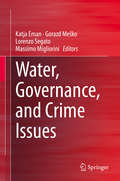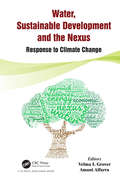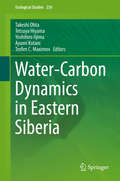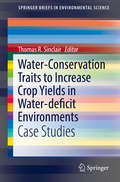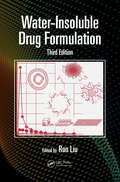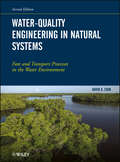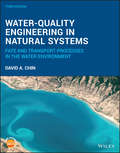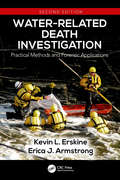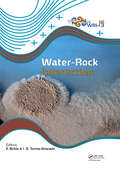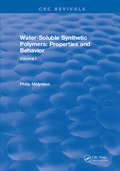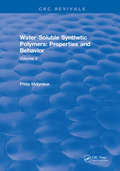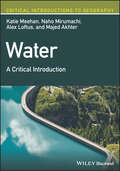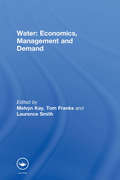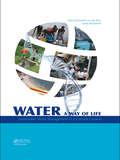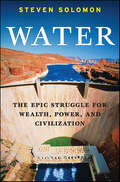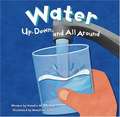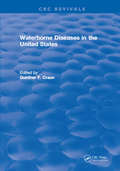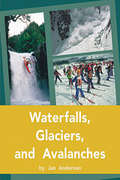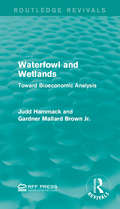- Table View
- List View
Water, Flood Management and Water Security Under a Changing Climate: Proceedings from the 7th International Conference on Water and Flood Management
by Anisul Haque Ahmed Ishtiaque Amin ChowdhuryThis book presents selected papers from the 7th International Conference on Water and Flood Management,with a special focus on Water Security under Climate Change, held in Dhaka, Bangladesh in March 2019. The biennial conference is organized by Institute of Water and Flood Management of Bangladesh University of Engineering and Technology. The recent decades have experienced more frequent natural calamities and it is believed that climate change is an important driving factor for such hazards. Each part of the hydrological cycle is affected by global climate change. Moreover, increasing population and economic activities are posing a bigger threat to water sources. To ensure sustainable livelihoods, safeguard ecosystem services, and enhance socio-economic development, water security needs to be investigated widely in a global and regional context.
Water, Food and Human Health in the Galapagos, Ecuador: "A Little World Within Itself" (Social and Ecological Interactions in the Galapagos Islands)
by Amanda L. Thompson Valeria Ochoa-Herrera Enrique TeranIn this book, we bring together interdisciplinary scholars and clinicians in medicine, public health, anthropology, nutrition, environmental sciences, and geography from the University of North Carolina at Chapel Hill, Universidad San Francisco de Quito, the Ministry of Health and the Hospital Oskar Jandl. Together, these authors provide a comprehensive description of the factors shaping water quality, food availability, and health services on the islands, their implications for human health and well-being, and potential avenues for intervention.
Water, Governance, and Crime Issues
by Gorazd Meško Katja Eman Lorenzo Segato Massimo MiglioriniThis book provides an overview of crimes involving water, including pollution, illegal dumping, and supply chain disruption from a criminological perspective. It examines a multifaceted issue from a comparative policy perspective supplemented with individual case studies to provide insights on the magnitude of the problem as well as possible solutions and policy recommendations. As growing populations and economic sectors continue to put unprecedented pressures on water supplies, the book aims to contribute to a better understanding of the problem in order to ensure the sustainability, long-term viability, and equitable use of this essential resource.The first part of the volume examines criminological and policy perspectives, including an overview of regulatory approaches, privatization of water resources, and the scope of the criminal problem in this area. The second part presents informative case studies from a variety of different regional and social contexts. Finally, the editors present an outlook in policy and enforcement improvements. This work will be of interest to researchers in criminology, criminal justice, public policy, and comparative law, as well as those studying environmental regulations and sustainability.Water, Governance and Crime Issues is a much needed addition to the growing original contributions of green criminology. This volume captures the complex landscape of water crimes, including the numerous disparities and inequalities of there being too much water in some places and too little in others amongst the many complexities. The edited collection also covers conceptual issues (i.e. water as a human right) as well as practical hurdles (i.e. the challenges in keeping statistics on offences) and real world examples. Many of the chapters are likely to introduce readers to new issues and the interplay with a myriad of traditional problems – corruption, organised crime, privatisation, and terrorism. I agree with the editors and authors that water crime issues deserve further scientific study and this provides a solid starting point.-Dr. Tanya Wyatt, University of Northumbria Population growth and urbanization, more frequent droughts due to climate change, the privatization of and unequal access to water resources and increasing water pollution are just some of the contemporary and future challenges relating to water crimes. Water, Governance and Crime Issues speaks to the scientific relevance of water for (green) criminology as well as the policy implications of water crimes. Several of the cases in this edited book refer to countries and regions we do not usually hear about and yet are perfect illustrations of the challenges faced in governing and studying water crimes.-Dr. Lieselot Bisschop, Erasmus School of Law
Water, Sustainable Development and the Nexus: Response to Climate Change (Water)
by Velma I. Grover Amani AlfarraWater is intricately linked with food security, energy security, and sustainable development. As the world is moving towards sustainable development goals, it is critical to recognize the role of water in attaining these goals. The Water-Energy-Food Nexus draws attention to the complex and interrelated nature of global resource systems and forces us to think about how a decision in one sector impacts other interlinked sectors as well. This book looks at the three dimensions of sustainable development-environment, economics and society-and how water is linked with them and explores the nexus approach as a framework to look at the issues and identify solutions.
Water, Wind, Earth, and Fire: The Christian Practice of Praying with the Elements
by Valters Christine PaintnerOrganized around The Canticle of the Creatures by St. Francis of Assisi, Water, Wind, Earth, and Fire is the first book to consider the ways in which praying with the natural elements can enliven Christian spiritual life. Paintner offers concrete suggestions and guided contemplative exercises; for instance, she suggests that readers take time to ¿watch the sunrise or sunset and breathe in the beauty of the fiery sky. Contemplate what those beginnings and endings have to say in your own life. ¿ Readers benefit from Paintner¿s extensive training in theology and Benedictine spirituality, as well as her unique work in bringing the expressive arts to spiritual direction.
Water-Carbon Dynamics in Eastern Siberia (Ecological Studies #236)
by Tetsuya Hiyama Takeshi Ohta Yoshihiro Iijima Ayumi Kotani Trofim C. MaximovThis book discusses the water and carbon cycle system in the permafrost region of eastern Siberia, Providing vitalin sights into how climate change has affected the permafrost environment in recent decades. It analyzes the relationships between precipitation and evapotranspiration, gross primary production and runoff in the permafrost regions, which differ from those intropical and temperate forests. Eastern Siberia is located in the easternmost part of the Eurasian continent, and the land surface with underlying permafrost has developed over a period of seventy thousand years. The permafrost ecosystem has specific hydrological and meteorological characteristics in terms of the water and carbon dynamics, and the current global warming and resulting changes in the permafrost environment are serious issues in the high-latitude regions. The book is a valuable resource for students, researchers and professionals interested in forest meteorology and hydrology, forest ecology, and boreal vegetation, as well as the impact of climate change and water-carbon cycles in permafrost and non-permafrost regions.
Water-Conservation Traits to Increase Crop Yields in Water-deficit Environments
by Thomas R. SinclairThis volume explores specific approaches that have shown to result in crop yield increases. Research on the physiological understanding of these methods has led to the development of practical applications of plant breeding approaches to genetically improve crops to achieve higher yields. Authoritative entries from crop scientists shed new light on two water-conservation traits: one that is based on an initiation of the decrease in transpiration earlier in the soil drying cycle, and the second that is based on a sensitivity of transpiration rate under high atmospheric vapor pressure deficit that results in partial stomatal closure. Both these approaches involve partial stomatal closure under well-defined situations to decrease the rate of soil water loss. Readers will be able to analyze the circumstances under which a benefit is achieved as a result of the water-limitation trait; and key discussion points in the case studies presented will help answer questions such as what species, which environments, how often will yield be benefited for various crop species? Contributions also review the genetic variation for these two traits within each crop species and the physiological basis for the expression of these traits.
Water-Energy-Nexus in the Ecological Transition: Natural-Based Solutions, Advanced Technologies and Best Practices for Environmental Sustainability (Advances in Science, Technology & Innovation)
by Vincenzo Naddeo Mohamed Ksibi Kwang-Ho ChooThis volume includes selected contributions presented during the 3rd edition of the international conference on WaterEnergyNEXUS, which was held in Tunisia in December 2020. This conference was organized by the University of Sfax (Tunisia), in cooperation with the Sanitary Environmental Engineering Division (SEED) of the University of Salerno (Italy), the Advanced Institute of Water Industry at Kyungpook National University (Korea) and The Energy and Resources Institute, TERI (India). The WaterEnergyNEXUS series of conferences are supported by the UNESCO World Water Association Programme (WWAP) and the International Water Association (IWA). It also enjoys the patronage of several international scientific societies, associations and organizations and has established a publishing partnership with Springer Nature. With the support of international experts invited as plenary and keynote speakers, the conference aimed to give a platform for Euro-Mediterranean countries to share and discuss key topics on such water-energy issues through the presentation of nature-based solutions, advanced technologies and best practices for a more sustainable environment within the framework of the ecological transition. This volume gives a general and brief overview of current research focusing on emerging Water-Energy-Nexus issues and challenges and their potential applications to various environmental problems impacting the Euro-Mediterranean zone and surrounding regions. A selection of novel and alternative solutions applied worldwide are included. The volume contains over about one hundred carefully refereed contributions from 48 Countries worldwide selected for the conference. Topics covered in the book include: Nexus framework and governance; Economic evalu ations for investment projects in the water and energy sectors; Innovation of renewable energies and challenges for the mitigation of climate change impact in the water-energy-food-nexus; Advanced technologies and nature-based solutions for the environmental sustainability of the water sector; Water and wastewater technologies for developing countries; Green technologies for sustainable water and wastewater management; Advanced technologies and nature-based solutions in water cycle; Control of hazardous substances and recovery of renewable/valuable resources; Renewable/valuable resources for recovery and utilization; Control of nutrients and hazardous compounds; Energy-saving technologies and future clean energy solutions; Future urban-energy systems with considerations of water and food security; Environmental Biotechnology and Bioenergy; Implementation and best practices. This volume is also an invaluable guide for industry professionals and policymakers working in the water and energy sectors.
Water-Insoluble Drug Formulation
by Rong Ron LiuProperties and Formulation: From Theory to Real-World Application Scientists have attributed more than 40 percent of the failures in new drug development to poor biopharmaceutical properties, particularly water insolubility. Issues surrounding water insolubility can postpone or completely derail important new drug development. Even the much-needed reformulation of currently marketed products can be significantly affected by these challenges. More recently it was reported that the percentage increased to 90% for the candidates of new chemical entities in the discovery stage and 75% for compounds under development. In the most comprehensive resource on the topic, this third edition of Water-Insoluble Drug Formulation brings together a distinguished team of experts to provide the scientific background and step-by-step guidance needed to deal with solubility issues in drug development. Twenty-three chapters systematically describe the detailed discussion on solubility theories, solubility prediction models, the aspects of preformulation, biopharmaceutics, pharmacokinetics, regulatory, and discovery support of water-insoluble drugs to various techniques used in developing delivery systems for water-insoluble drugs. This book includes more than 15 water-insoluble drug delivery systems or technologies, illustrated with case studies and featuring oral and parenteral applications. Highlighting the most current information and data available, this seminal volume reflects the significant progress that has been made in nearly all aspects of this field. The aim of this book is to provide a handy reference for pharmaceutical scientists in the handling of formulation issues related to water-insoluble drugs. In addition, this book may be useful to pharmacy and chemistry undergraduate students and pharmaceutical and biopharmaceutical graduate students to enhance their knowledge in the techniques of drug solubilization and dissolution enhancement.
Water-Quality Engineering in Natural Systems: Fate and Transport Processes in the Water Environment
by David A. ChinProvides the tools needed to control and remediate the quality of natural water systems Now in its Second Edition, this acclaimed text sets forth core concepts and principles that govern the fate and transport of contaminants in water, giving environmental and civil engineers and students a full set of tools to design systems that effectively control and remediate the quality of natural waters. Readers will find coverage of all major classes of water bodies. Moreover, the author discusses the terrestrial fate and transport of contaminants in watersheds, underscoring the link between terrestrial loadings and water pollution. Water-Quality Engineering in Natural Systems begins with an introduction exploring the sources of water pollution and the control of water pollution. It then presents the fundamentals of fate and transport, including the derivation and application of the advection–diffusion equation. Next, the text covers issues that are unique to: Rivers and streams Groundwater Watersheds Lakes and reservoirs Wetlands Oceans and estuaries The final two chapters are dedicated to analyzing water-quality measurements and modeling water quality. This Second Edition is thoroughly updated based on the latest findings, practices, and standards. In particular, readers will find new methods for calculating total maximum daily loads for river contaminants, with specific examples detailing the fate and transport of bacteria, a pressing problem throughout the world. With end-of-chapter problems and plenty of worked examples, Water-Quality Engineering in Natural Systems enables readers to not only understand what happens to contaminants in water, but also design systems to protect people from toxic pollutants.
Water-Quality Engineering in Natural Systems: Fate and Transport Processes in the Water Environment
by David A. ChinThis textbook describes in detail the fundamental equations that govern the fate and transport of contaminants in the environment, and covers the application of these equations to engineering design and environmental impact analysis relating to contaminant discharges into rivers, lakes, wetlands, groundwater, and oceans. The third edition provides numerous end-of-chapter problems and an expanded solutions manual. Also introduced in this edition are PowerPoints slides for all chapters so that instructors have a ready-made course. Key distinguishing features of this book include: detailed coverage of the science behind water-quality regulations, state-of-the-art methods for calculating total maximum daily loads (TMDLs) for the remediation of impaired waters, modeling and control of nutrient levels in lakes and reservoirs, design of constructed treatment wetlands, design of groundwater remediation systems, design of ocean outfalls, control of oil spills in the ocean, and the design of systems to control the quality of surface runoff from watersheds into their receiving waters. In addition, the entire book is updated to provide the latest advances in the field of water-quality control. For example, concepts such as mixing zones are expanded to include physical nature and regulatory importance of mixing zones, practical aspects of outfall and diffuser design are also included, specific details of water-quality modeling are updated to reflect the latest developments on this topic, and new findings relating to priority and emerging pollutants are added.
Water-Related Death Investigation: Practical Methods and Forensic Applications
by Kevin L. Erskine Erica J. ArmstrongNearly ten years after the first edition of Water-Related Death Investigation: Practical Methods and Forensic Applications, water death cases continue to be improperly investigated. The pathologist’s report can determine the cause of death as a drowning, but the manner of death is the most challenging to prove. The report will not determine if a victim jumped into the water to commit suicide, fell into the water accidentally, or was pushed in as a homicidal act. Many drowning cases do not reflect injury to the body, so evidence collected at the scene plays a vital role. The importance of an on-scene body assessment cannot be overemphasized. Often, the body evidence begins to change rapidly upon recovery and may not be present during an autopsy. Written statements on the scene are an effective tool to use to determine the accuracy of information given to arriving officers. These statements need to be written by the witnesses themselves as well as the reporting person. The "Show Me" technique can also help reveal discrepancies in a person’s version of what occurred as well as aid in providing the most details to an incident as is humanly possible. This second edition includes updated information on the latest technology to assist water death investigators. Parabon Snapshot can help determine the faceless identity of skeletal remains and help locate potential suspects using the science of DNA. Drones can aid in locating missing persons as well as human remains, even months after death. Updated information is provided regarding fingerprints from submerged objects, and Carbon-14 can help determine the origin of a found corpse. Key Features: Thoroughly reviews the physiological aspects of drowning Reveals the investigative characteristics inherent to various scenes of water-related deaths Highlights certain "red flag" indicators that may point to foul play or scene staging Outlines autopsy protocols, trial preparation, and expert witness testimony Provides numerous case studies and numerous illustrations to further clarify key points presented in the text Coauthored by a Master Water Death Investigator and an experienced forensic pathologist, Water-Related Death Investigation: Practical Methods and Forensic Applications, Second Edition merges the essentials of evidence collection and field investigation with autopsy best practices and laboratory testing. It will continue to serve as a valuable resource for the various professionals involved in these cases.
Water-Rock Interaction XIII
by Peter Birkle Ignacio S. Torres-AlvaradoIn the late 18th century, Neptunists and Plutonists had controversial opinions about the formation of the Earth and its lithological units. The former believed that rocks formed from the crystallization of minerals in the early Earth's oceans, the latter believed that rocks were formed in fire. Both theories ignored the importance of continuous wat
Water-Soluble Synthetic Polymers: Volume I: Properties and Behavior
by Philip MolyneuxAlthough several monographs and reviews have appeared on individual polymers of this type, and their applications and other technical aspects have also been discussed, this is apparently the first book to deal with the physical chemistry of water-soluble synthetic polymers as a group. This collective survey enables their properties and behaviour to be compared, and to be correlated with their molecular structures for predictive purposes. However, this has made it necessary to critically re-appraise much of the earlier fundamental work, so that current discussion of more recent work can be put on ta proper basis. Thus, of the 1800 or so references cited, the middle two-thirds related to the twenty-year period centred on about 1968. Nevertheless, sufficient key recent references have also been included so that the existing ‘state of the art is delineated.
Water-Soluble Synthetic Polymers: Volume II: Properties and Behavior
by Philip MolyneuxAlthough several monographs and reviews have appeared on individual polymers of this type, and their applications and other technical aspects have also been discussed, this is apparently the first book to deal with the physical chemistry of water-soluble synthetic polymers as a group. This collective survey enables their properties and behaviour to be compared, and to be correlated with their molecular structures for predictive purposes. However, this has made it necessary to critically re-appraise much of the earlier fundamental work, so that current discussion of more recent work can be put on ta proper basis. Thus, of the 1800 or so references cited, the middle two-thirds related to the twenty-year period centred on about 1968. Nevertheless, sufficient key recent references have also been included so that the existing ‘state of the art is delineated.
Water: A Critical Introduction (Critical Introductions to Geography)
by Alex Loftus Naho Mirumachi Katie Meehan Majed AkhterDiscover the hydrosocial cycle and the impact of power, knowledge, and scarcity on water rights and use through this engaging and student-friendly textbook In Water: A Critical Introduction, a team of distinguished researchers delivers an expert examination of our most pressing water-related challenges, arguing that flows of water are shaped by social practices and geometries of power. Combining first-hand research and headline case studies, the authors reveal the hydrosocial relations often hidden in mainstream accounts of water, delving into current issues like water scarcity, floods, global water governance, legal conflicts, human rights, potable water provision, health, the water-food-energy nexus, and much more. Spanning five centuries, this comprehensive volume reflects on how imperial expansion has shaped hydrosocial relations in and between Europe, Asia, Africa, and the Americas, how water demand has changed over time, and how this change impacted lifestyle. As the first major text to synthesize critical water research in both local and global perspectives, this book is anchored by clear and compelling arguments — the "four planks" — and supported by the authors' original research and up-to-date synthesis of the latest critical research on major water problems. It also includes maps, illustrations, and additional learning materials to be used by educators. Readers will find: A lively and thorough introduction that explains why a critical approach is necessary to fully understand our current water challenges, with a focus on the "skeptical superhero" A global approach to key debates in water issues, including large dams, privatization, transboundary conflicts, agriculture and irrigation, water and sanitation provision, human rights, governance dilemmas, and the Sustainable Development Goals Comprehensive explorations of the roles played by expert knowledge, global capital, climate change, and justice struggles in the hydrosocial cycle Critical theoretical perspectives that integrate environmental social sciences, feminist critique, and a broadly defined political economy with the specificities of water resources Fulsome treatments of water governance, science, and management, including the origins and implications of neoliberal approaches to the privatization, commodification, and financialization of water An accessible text that "invites the reader" on a critical journey Water: A Critical Introduction is a key text for advanced high school, undergraduate, and graduate students who want a keener understanding of trends in environmental management, political ecology, and water governance, science, and engineering. Written with an interdisciplinary audience in mind, this book will benefit students taking courses in environmental studies, environmental law, geopolitics, international studies, human geography, hydrology, engineering, environmental economics, and related disciplines.
Water: Basic Science
by Sheng Meng Enge WangThis book highlights the fundamentals for understanding the essential problems and latest progresses in basic water science. Water is the most abundant, fundamental and important matter in nature. Arguably it is also the material that human beings study the most but misunderstand the most. Compared with the environmental science and engineering research activities on water resources, water pollution and water usage closely related to social problems at the macro level, basic scientific research on water at the molecular level has just emerged, the impact of which is not fully recognized yet. This book is devoted to introducing some important advances in the field of basic water science in past decades, with a particular emphasis on recent results on water and the interactions between water and solid surfaces at the molecular level. Starting from introducing concepts and popular theoretical and experimental methods for basic water research, this book mainly focuses on the atomic composition, electronic structure, and physicochemical properties of water molecules, water clusters and water layers (including surface water layers and water surface layers), rules for water adsorption on metals, oxides, and other typical solid surfaces such as salt, as well as the microscopic processes and mechanisms of water diffusion, wetting, decomposition and phase transformations under a variety of conditions. It is a good reference book for students and researchers in water-related science.
Water: Economics, Management and Demand
by Melvyn Kay Laurence Smith Tom FranksWater is often seen as a free commodity. However, this is rarely the case as demand for water is increasing significantly across the world. This book focuses on the key roles of irrigaiton and drainage in the debate on water. Irrigation is a major player in the demand for water and already accounts for between 70-80% of the total world consumption.
Water: FOSS Science Stories
by University of California at Berkeley Lawrence Hall of ScienceNIMAC-sourced textbook
Water: Sustainable water management in a cultural context
by A.J.M. (Lida) Schelwald-van der Kley Linda ReijerkerkWhy do many water management projects, begun with the best of intentions, still fail? How is it that large infrastructural water works often encounter opposition? Is it perhaps, among other things, the lack of attention for the cultural context? These and other intriguing questions are dealt with in this book. The authors, having 20 years of e
Water: The Epic Struggle for Wealth, Power, and Civilization
by Steven Solomon“I read this wide-ranging and thoughtful book while sitting on the banks of the Ganges near Varanasi—it's a river already badly polluted, and now threatened by the melting of the loss of the glaciers at its source to global warming. Four hundred million people depend on it, and there's no backup plan. As Steven Solomon makes clear, the same is true the world over; this volume will give you the background to understand the forces that will drive much of 21st century history.” —Bill McKibben In Water, esteemed journalist Steven Solomon describes a terrifying—and all too real—world in which access to fresh water has replaced oil as the primary cause of global conflicts that increasingly emanate from drought-ridden, overpopulated areas of the world. Meticulously researched and undeniably prescient, Water is a stunningly clear-eyed action statement on what Robert F Kennedy, Jr. calls “the biggest environmental and political challenge of our time.”
Water: Up, Down, And All Around (Amazing Science Ser.)
by Natalie M. RosinskyDescribes the water cycle and the importance of water, explaining evaporation and condensation, dew and frost, and the three states of water.
Waterborne Diseases in the US
by Gunther F. CraunThis book examines, in both a current and historical context, water-related illness in the U.S. Emphasis is placed upon the transmission of infectious diseases through contaminated drinking water supplies and those deficiencies in water supply systems which allow waterborne outbreaks to occur. Chapters have been included on the important etiologic agents responsible for waterborne outbreaks in the U.S., surveillance activities, regulations, water treatment to prevent the occurrence of waterborne outbreaks and procedures for investigating waterborne outbreaks. For completeness, discussion have been included on illnesses contracted by ingestion of contact with waters for bathing , swimming, or wading and chronic ingestion of low levels of chemical contaminants in drinking water; however, because of space limitations there are necessarily brief, and the reader is directed toward the provided references, which discuss these subjects in more depth.
Waterfalls, Glaciers, and Avalanches (Rigby PM Plus Non Fiction Ruby (Levels 27-28), Fountas & Pinnell Select Collections Grade 3 Level Q)
by Jan AndersonThis text focuses upon the movement and flow of water, ice and snow, and how this affects the environment and the lifestyles of the people who live there. Text forms include a labelled diagram, a diary excerpt and a newspaper report.
Waterfowl and Wetlands: Toward Bioeconomic Analysis (Routledge Revivals)
by Judd Hammack Gardner Mallard Brown Jr.Originally published in 1974, Waterfowl and Wetlands analyses waterfowl hunting patterns in the late sixties in the hopes of protecting waterfowl resources such as wetlands. Wetlands are obviously an important resource for migratory waterfowl however they are often drained for agricultural purposes which can have dramatic effects on waterfowl population. This study aims to explore the issues surrounding waterfowl and wetlands in an attempt to determine their value to hunters, farmers and the general public. This study will be of interest to students of Environmental Studies.


